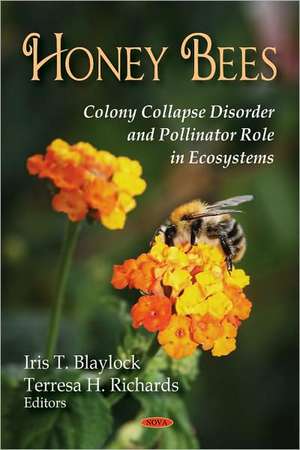Honey Bees
Editat de Iris T. Blaylock, Terresa H. Richardsen Limba Engleză Hardback – 12 mai 2009
Preț: 976.96 lei
Preț vechi: 1141.30 lei
-14% Nou
Puncte Express: 1465
Preț estimativ în valută:
186.94€ • 195.68$ • 155.59£
186.94€ • 195.68$ • 155.59£
Carte indisponibilă temporar
Doresc să fiu notificat când acest titlu va fi disponibil:
Se trimite...
Preluare comenzi: 021 569.72.76
Specificații
ISBN-13: 9781606926888
ISBN-10: 1606926888
Pagini: 282
Ilustrații: b/w photos
Dimensiuni: 188 x 267 x 24 mm
Greutate: 0.77 kg
Editura: Nova Science Publishers Inc
ISBN-10: 1606926888
Pagini: 282
Ilustrații: b/w photos
Dimensiuni: 188 x 267 x 24 mm
Greutate: 0.77 kg
Editura: Nova Science Publishers Inc
Cuprins
Preface; Recent Honey Bee Colony Declines (Renee Johnson); Colony Collapse Disorder Action Plan (CCD Steering Committee, June 20, 2007); Colony Collapse Disorder: A Complex Buzz (Agricultural Research May/June 2008); Colony Collapse Disorder in Honey Bee Colonies Across the United States: Hearing before the Subcommittee on Horticulture and Organic Agriculture of the Committee on Agriculture House of Representatives One Hundred Tenth Congress First Session, March 29, 1007; (Committee on Agriculture, U.S. Government Printing Office); "The Birds and the Bees" - How Pollinators Help Maintain Health Ecosystems; Statement of John Replogle, President and CEO, Burt's Bees, Durham, North Carolina Before the Subcommittee on Horticulture and Organic Agriculture, Committee on Agriculture, U.S. House of Representatives, June 26, 2008; Testimony of David Mendes, Vice President, American Beekeeping Federation, Inc., North Fort Meyers, Florida, For the Committee on Agriculture Subcommittee on Horticulture and Organic Agriculture, Hearing on the Status of Research on Pollinator Health Including Colony Collapse Disorder in Honey Bee Colonies, U.S. House of Representatives, June 26, 2008; Statement of Dr. Kevin Hackett, National Program Leader for Bees and Pollination, Agricultural Research Service, United States Dept. of Agriculture Before the United States House of Representatives, National Resources Committee, Subcommittee on Fisheries, Wildlife, and Oceans, Oversight Hearing - The Birds and the Bees: How Pollinators Help Maintain Healthy Ecosystems; Before the United States House of Representatives, Subcommittee on Horticulture and Organic Agriculture, Committee on Agriculture, Testimony of Katty Pien, Brand Director, Haagen-Dazs Ice Cream, June 26, 2008; Prepared Testimony of Keith S. Delaplane, Professor of Entomology, Univ. of Georgia before the U.S. House of Representatives, Committee on Agriculture, Subcommittee on Horticulture and Organic Agriculture, Plans for Coordinated Research and Education to Reverse Pollinator Decline, June 26, 2008; Prepared Testimony of Maryann Frazier, Senior Extension Associate, Dept. of Entomology, The Pennsylvania State Univ. before the U.S. House of Representatives, Committee on Agriculture, Subcommittee on Horticulture and Organic Agriculture on Update on Colony Collapse Disorder in Honey Bee Colonies in the United States, June 26, 2008; Statement of Dr. Edward B. Knipling, Administrator, Agricultural Research Service, United States Dept. of Agriculture Before the United States House of Representatives, Committee on Agriculture, Subcommittee on Horticulture and Organic Agriculture, Hearing on Pollinator Health and Colony Collapse Disorder, June 26, 2008; Testimony of Steve Godlin, S.P. Godlin Apiaries, Visalia, California for the Committee on Agriculture, Subcommittee on Horticulture and Organic Agriculture, Hearing on the Status of Research on Pollinator Health Including Colony Collapse Disorder in Honey Bee Colonies, U.S. House of Representatives, June 26, 2008; Statement of Robert D. Edwards, Grower, Halifax County, North Carolina, Before the U.S. House Agriculture Subcommittee, On Horticulture and Organic Agriculture, Thursday, June 26, 2008; Written Testimony of Daniel Binford Weaver, President of the American Beekeeping Federation, Inc., June 26th, 2007 before the Subcommittee on Fisheries, Wildlife and Oceans, Committee on Natural Resources; Congress of the United States, House of Representatives, Washington, DC, Congressman Earl Blumenauer, Testimony before Natural Resources, Subcommittee on Fisheries, Wildlife and Oceans, Hearing on "The Birds and the Bees: How Pollinators Help Maintain Healthy Ecosystems", June 26, 2007; Congress of the United States, House of Representatives, Washington, DC, Testimony of the Honorable Alcee L. Hastings, The Importance of the Pollinator Protection Act and Other Policy Responses to North American Pollinator Decline, Subcommittee on Fisheries, Wildlife and Oceans, Committee on Natural Resources, United States House of Representatives, June 26, 2007; Testimony of Dr. Mamie Parker, Assistant Director for Fisheries and Habitat Conservation, United States Fish and Wildlife Service, Department of the Interior, Before the House Natural Resources Subcommittee on Fisheries, Wildlife, and Oceans, Regarding Pollinators, June 26, 2007; Testimony Presented Before the Subcommittee on Fisheries, Wildlife and Oceans, Committee on Natural Resources, U.S. House of Representatives, "The Birds and the Bees: How Pollinators Help Maintain Healthy Ecosystems" June 26, 2007; Index.
